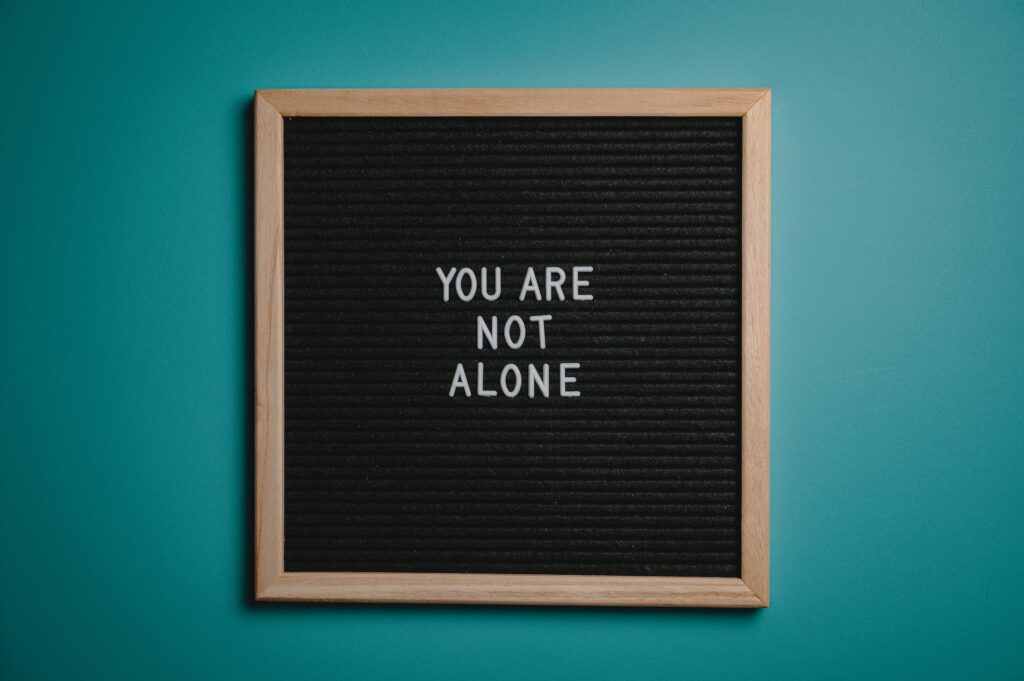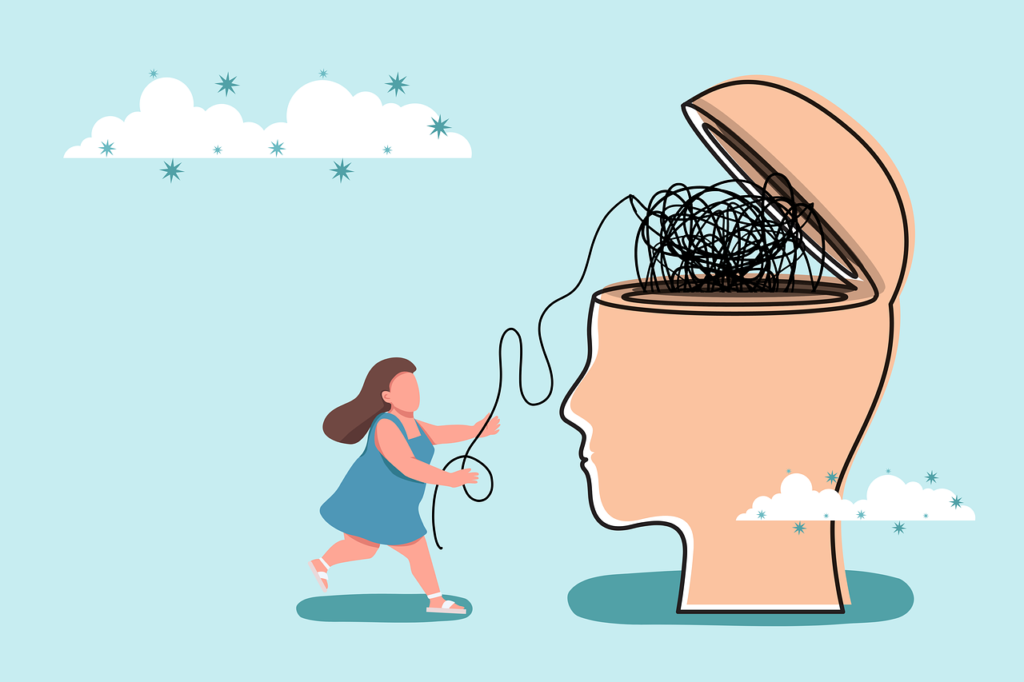
Navigation of the Mind: A Personal Journey Towards Mental Health Awareness
Navigation of the Mind: A Personal Journey Towards Mental Health Awareness
It’s easy to lose sight of the importance of mental health in the hustle and bustle of our chaotic everyday lives. For a long time, I was guilty of ignoring my own Mental health well-being, disregarding the signs and symptoms that silently demanded my attention. A few years ago I began my own path toward mental health awareness when I decided to go for therapy because of the anxiety and other issues I faced.I realised how profoundly it may affect our whole quality of life. In this blog post, I’ll discuss my personal experiences, struggles, and victories as a person traversing the tough landscape of mental health.
Signals Which Were Ignored deteriorating Mental health
Growing up, my family rarely mentioned the topic of mental health. It was an invisible domain, hidden by heightened uncertainty. Stress, anxiety, and grief were discounted as temporary emotions that would pass with time. I had no idea that these ignored signals were the whispers of a mind begging for attention as well as recognition.
The Breaking Point
It wasn’t until I hit a breaking point in my early twenties that I acknowledged how serious the situation was. The grind of everyday life had taken its toll on me, and I found myself dealing with anxiety that appeared to dominate all aspects of my existence. Sleepless nights, persistent stress, and an overwhelming sensation of fear were my unwanted companions. It was at this point that I decided to face my mental health head on.

The Stigma Around Mental Health
One of the most difficult challenges I encountered on my journey was the widespread judgement associated with mental health. Admitting that I was battling with my mental health felt like admitting a weakness, and society standards seemed to dictate that I should just “strengthen up.” However, I quickly realised that getting help and talking about my problems was a sign of strength, not weakness. Since then I realised that anxiety is my superpower.
Breaking the silence
Breaking the stigma around mental health was an important turning point in my life’s journey. I confided in friends and family, gradually breaking down the walls I had built around what I was feeling. I was surprised to find a response of compassion and empathy that I hadn’t expected. This experience demonstrated the necessity of supporting open discussions about mental health in order to build a supportive environment for individuals in need.
Professional Help: A Crucial Point
Acknowledging the need for professional aid was another critical step in the right path. I sought therapy, which turned out to be the best decision and transforming experience. Having a qualified professional help me through the maze of my thoughts and emotions gave me significant insights into the underlying causes of my problems. Therapy provided a secure area for me to express and process my emotions without being judged.
The relevance of self-care
Parallel to therapy, I began implementing self-care techniques into my everyday routine. From mindfulness exercises to regular physical activity, these tiny acts of self-love were crucial to my mental health recovery. I realised that taking time for myself was not a luxury, but rather a requirement for preserving a balanced life as well as mental and physical well-being. I began to do things I had never done for myself before. I began to set boundaries. I began to care for my health, mind, and the people I spent time with. I started spending time with myself and since then I realised how good it feels to be with yourself.

Challenges along the way
While my journey on the road to becoming more aware of mental health has been defined by growth and advancement, it has not been without challenges. There were moments of relapse and setbacks that put my resilience to test. However, learning to see these obstacles as opportunities for self-discovery and growth helped me manage the inevitable ups and downs of my mental health journey.
The importance of community
As I explored more into the complicated nature of my mental health, I realised how crucial community is in the process. Connecting with others who went through similar challenges provided a sense of unity and acceptance. Either through support groups, forums on the internet, or social networking sites, the shared experiences of other people served as an empowering reminder that I was not alone in my path. I realised that if i become open about my problems and the way i handle my mental health other people will also feel that they are not alone and we all can get over all the things we are facing in our daily life.
Empowering Others
In my pursuit for mental health awareness, I realised how important it was for me to inform others. To encourage understanding and acceptance, it is necessary to break down misconceptions and cultivate empathy on a regular basis. I intended to contribute to the larger conversation around mental health by engaging in open conversations, writing about it, being more open about it, and sharing my own story.
As I progress on my journey to mental health awareness, I realise that it is a continuous process. Just as physical health necessitates regular attention, so does our mental health. It has become apparent to me that mental health is an ever-changing journey driven by a variety of elements such as life experiences, relationships, and outside pressures.
Relatable things people don’t talk about regarding mental health:
1. The Constant Psychological Struggle
Dealing with a psychological health issue is an ongoing internal struggle. It is not a one-time occurrence or a series of isolated incidents; it is a continuous process that necessitates continual effort and resilience.
2. The Importance of Highly Functional Anxiety or Depression
Individuals with high-functioning anxiety or depression may experience both external success and internal turmoil. The ability to carry out tasks doesn’t reduce the emotional weight carried behind the scenes.
3. The Isolation Even in a crowded room
Even when you are surrounded by people, you might still feel lonely and alone. Mental health issues frequently result in a sense of isolation, making it difficult to communicate our internal issues to others around us.
4. Fear of being judged and rejected
There is widespread anxiety of being judged or rejected because of mental health difficulties. The fear frequently restricts people from speaking out about their problems, prolonging a cycle of silence and loneliness. Even I went through the same thing.
5. The Effect on Relationships
Mental health issues have a complex impact on relationships. It is not only about the individual who has the problem; it is also about the burden it takes on their relationships with family, friends, and romantic partners.
6. Physical Signs of Mental Strain
Mental health concerns can manifest physically, such as chronic fatigue, headaches, muscle tension, or digestive problems. The mind-body connection exists, and mental challenges can have substantial physical consequences.
7. The Invisibility of Internal Conflicts
Unlike evident injuries or illnesses, mental health issues are frequently ignored. This invisibility can result in a lack of understanding from others, making it difficult for people to get the help they need.
8. Daily Triumphs and Small Wins
Celebrating little wins is an important aspect of the mental health journey. Whether it’s getting out of bed, going to a social gathering, or finishing a chore, these accomplishments should be recognized and appreciated.
9. Impact on Self-Identity
Mental health difficulties can have a significant impact on one’s sense of self. The process of embracing and reinventing identity in the context of mental health is rarely emphasised, yet it is an important part of the journey.
10. The relapse and recovery cycle
Mental health improvements are rarely predictable. The relapse and recovery cycle is a common occurrence, and setbacks do not hinder progress. Recognising the cyclical nature is critical for long-term rehabilitation.
11. The Financial Strains of Mental Health
Mental health care can be expensive. From therapy charges to drug costs, the financial hardship adds another layer of stress to those seeking help.
12. Exhaustion from Masking Emotions
Maintaining a brave front can be difficult. The effort required to suppress one’s feelings and pretend ‘fine’ to the outer world might add to mental tiredness.
13. The Impact of Cultural and Social Standards
Cultural and societal expectations about mental health might add another degree of complication. Some cultures may stigmatise mental health conversations, making it difficult for people to seek assistance without fear of being judged.
14. The unpredictability of triggers
Triggers for mental health issues can be unforeseen and differ considerably from person to person. Understanding and regulating these triggers is an ongoing exercise requiring self-awareness.
15. The Strength of Compassion and Empathy
While the difficulties are frequently recognized, the life-changing impact of compassion and empathy is often overlooked. Small acts of compassion and empathy can have a significant impact on someone’s mental health.
Fostering open talks and breaking down stigmas are critical steps in creating a supportive and understanding atmosphere for everybody while dealing with the often-unspoken issues of mental health.

Nurturing Mental Wellness: A Personal Journey After Therapy
Self-Discovery in Therapy
Therapy provided a secure and nonjudgmental environment for self-discovery. Introspective conversations helped me peel back the layers of my thoughts, feelings, and past experiences. Understanding the patterns and triggers that contributed to my difficulties laid a solid basis for developing coping skills and cultivating resilience.
Learning Coping Strategies.
One of the most essential gifts therapy conferred on me was a toolset of coping methods. From mindfulness techniques to cognitive-behavioural exercises, I learned practical tools for navigating the ebb and flow of my emotions. Learning to recognize and combat negative thought patterns became a cornerstone of my mental health journey, giving me a renewed sense of control.
Setting Realistic Goals.
In the aftermath of therapy, I approached goal-setting from a different perspective. Understanding the value of setting realistic and attainable goals, I moved my attention from perfectionism to progress. Each modest victory served as a stepping stone, establishing a positive feedback loop that kept me motivated.
Mindfulness in Everyday Life.
The mindfulness techniques that I learned and practised in treatment have easily merged into my daily life. Whether it was savouring a meal attentively, practising focused breathing during stressful periods, or simply being present in regular activities, mindfulness served as an anchor, grounding me in the present moment and instilling a sense of serenity.
Growth and Acceptance
The progressive shift in perspective toward growth and acceptance was a crucial part of my post-therapy journey. I learnt to look at setbacks as chances for learning and improvement rather than failures. Accepting the experience, with its ups and downs, became a motto that formed my perspective on life.
Engaging in Continuous Learning
The journey to mental wellbeing is a continual process, and after therapy, I actively sought opportunities for continued learning. Reading psychology books, attending workshops, and engaging in support groups helped me grow my knowledge, improve my coping abilities, and connect with a community of people who were going through similar experiences.
Advocacy and Pay It Forward
Inspired by my own transformative journey, I felt obligated to promote mental health awareness. Breaking the silence on mental health became a personal commitment. Whether by sharing my story, engaging in community events, or supporting mental health programs, I embraced the position of support contributing to the greater push to de-stigmatize mental health issues.
Conclusion
To summarise, my post-therapy experience has been interconnected with self-awareness, resilience, and personal growth. Therapy worked as a catalyst, giving me the tools I needed to deal with the complexities of my internal environment. By embracing self-discovery, creating a strong support system, and incorporating mindful practices into my daily life, I’ve developed a mentally healthy lifestyle that extends beyond the therapist’s office.
The most important takeaway from my experience is that mental wellbeing is an ongoing commitment that necessitates self-compassion, continuous learning, and a willingness to accept the journey in all of its forms. By sharing my experience, I wish to inspire people to embark on their own paths to mental health, building a collaborative environment where stories of success, resilience, and growth
In sharing my personal journey towards mental health awareness, I hope to inspire others to embark on their own paths of self-discovery. The stigma surrounding mental health can only be dismantled through open dialogue and understanding. By fostering a culture of empathy and support, we can create a world where mental health is prioritised, and individuals feel empowered to seek the help they need. Remember, your mental health matters, and the journey towards awareness is a powerful step towards a more fulfilling and balanced life.
In the intricate tapestry of human existence, where emotions, thoughts, and experiences weave together, the unspoken struggles of mental health often become a silent battle. It is in this silence that individuals may feel isolated, convinced that they are traversing the tumultuous terrain of their minds alone. However, as the pages of one’s mental health story unfold, it becomes increasingly evident that no one is truly alone in facing these profound challenges.
In the mosaic of shared humanity, the threads of mental health struggles are interwoven, connecting us in ways that transcend the boundaries of individual experiences. The complexities of anxiety, depression, and other mental health conditions form a shared language, a silent conversation that bridges the gaps between diverse lives. Each person grappling with their internal turmoil is a testament to the universality of the human experience, where vulnerability is not a solitary endeavour but a collective journey.
Acknowledging this shared journey is a powerful revelation, breaking down the walls of isolation that mental health challenges often construct. It is a testament to the strength found in unity, as the collective weight of understanding, compassion, and empathy becomes a cornerstone for building a supportive community. In recognizing that no one walks this path alone, the narrative shifts from one of solitary endurance to a communal voyage toward healing and resilience.
The stigma surrounding mental health often thrives in silence and isolation. It perpetuates the notion that discussing one’s struggles is an admission of weakness or failure. However, the truth that emerges from the shadows of this stigma is that courage lies in vulnerability, and strength is found in seeking connection. When individuals come together to share their stories, whether through personal conversations, support groups, or public discourse, a powerful message resonates: the shared understanding that mental health matters, and no one is left behind in its discourse.
In this collective narrative, the contours of empathy become the bridges that span the gaps between experiences. Each tale of triumph, every disclosure of struggle, and the willingness to say, “I have been there too” form the foundation of a community that recognizes the shared humanity in facing mental health issues. It is a narrative that whispers, sometimes in a hushed tone and sometimes with resounding clarity, that there is strength in unity, and healing is a collaborative endeavour.
Moreover, the realisation that no one is alone in facing mental health issues brings with it the responsibility of fostering an environment where open conversations are not only encouraged but celebrated. It is a call to action, urging societies to dismantle the walls of stigma, ignorance, and judgement. By embracing the shared nature of mental health challenges, communities can cultivate a culture that prioritises understanding, support, and acceptance.
As we navigate the intricacies of our mental landscapes, let us carry with us the profound truth that no one walks alone. In the vast expanse of shared struggles and triumphs, there is solace, strength, and a shared journey toward well-being. By embracing this collective narrative, we pave the way for a future where mental health is regarded with the same importance as physical health—a future where no one feels isolated in their battle, and where the echoes of shared understanding drown out the silence of solitude. In unity, there is healing, and in the recognition that no one is alone, there is the promise of a brighter, more compassionate.